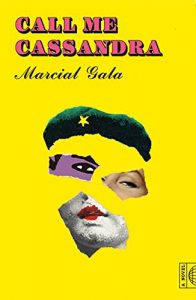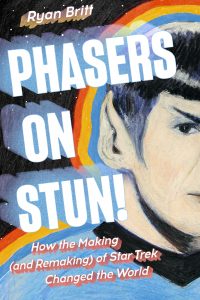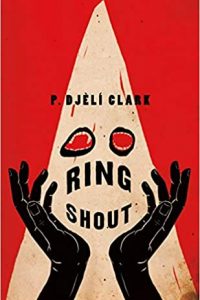Maya C. James Reviews Call Me Cassandra by Marcial Gala
 Call Me Cassandra, Marcial Gala (Farrar, Straus, Giroux 978-0-374-60201-7, $26.00, 211pp, hc) January 2022.
Call Me Cassandra, Marcial Gala (Farrar, Straus, Giroux 978-0-374-60201-7, $26.00, 211pp, hc) January 2022.
Content warning for Call Me Cassandra by Marcial Gala: transphobic violence and abuse.
Note: The main character is referred to as ‘‘he’’ by the author/translator.
Rauli is not like other children; he’s quiet, sensitive, and always reading stories of gods and myths. His father and brother are violent, and his mother can only do so much to protect him from their brutality and misplaced anger. Fate, gods, and violence swirl around Rauli as his father demands that he ‘‘man up,’’ and his classmates bully him for his interests. Despite the abuse, because of Cassandra’s curse Rauli knows three things to be true. ‘‘First, that he was born in the wrong body. Second, that he will die at eighteen, as a Cuban soldier in Angola. And third, that he is the reincarnation of the Trojan princess Cassandra.’’ Set between Cienfuegos, Cuba, the battlefields of Angola, and ancient Troy, Call Me Cassandra is a lyrical and mesmerizing tale of destiny and dreaming in the wrong body.
As Cuba’s conflict with Angola intensifies into war, Rauli lives a near-fearless life. He knows when he will die, and refuses to minimize himself in the meantime. Even without the dangers of being outed that many transgender people face, as a young person swept up in the dangerous mixtures of hope, lust, and fear, he still lives a hollowed-out life. Rauli is constantly told to repress Cassandra, even when he is asked to put on dresses and make-up for the admiration of others rather than himself.
Rauli’s gift and curse is not explicitly spelled out, but it is exactly that of the one he had in his previous life as Cassandra of Troy: uttering true prophecies that are never being believed. It’s quite a subversive take; Rauli never lies about a prophecy, and because of his body and his identity, he is even less likely to be believed. He witnesses the avoidable grief and loss of those around him, and it hollows him in a way that is saddening and profound to read. I was moved reading his interactions with his father and mother, as they were complicated for distinct reasons. To his mother, Rauli is the ghost of her recently-passed sister, and to his father, he is a confusing shell of a man who need only to man up to stop feeling so helpless.
Place is a key element of Gala’s tremendous novel. His lively lyricism and steady realism provide sharp insights into Cuba’s crumbling dreams of utopia, while also uplifting the dreams of men and women sent to die, either on the battlefields or in their unhappy marriages. Gala was raised in Cienfuegos for most of his life, and there is a clear appreciation and sense of careful construction of a place so vivid to him. It is an intimate and sensory look into a real place, even in the midst of tremendous prophecy and death. Casual anti-Blackness and transphobic violence permeate moments of calm, but Marcial Gala offers rich interior lives to even the seemingly shallowest of characters – not in a way that excuses their violence, but one that gently unravels the complexity behind their words and blows.
Violent men shape Rauli’s destiny in pattern-like ways that reflect real-world brutalities many women face, both in the ancient world and his current world. Men are either attracted to him, and react to their attraction with shame or violence, or, they are intrigued by him in a terrifyingly exoticizing manner. Fate is his number one guardian and protector. One small character choice I noticed is that Rauli is almost too calm and grounded. Never fearing being outed or killed for his looks, he knows his death will come later in Angola. His joy and freedom to dress feminine and as his true self is joyous to read, but I occasionally did wish for more complexity as it related to Rauli’s interactions with other characters. Rauli is not a particularly happy child, nor is he depressed. He is committed to his destiny because he knows he cannot run away from it. He occasionally offers biting insight into the ignorance of some characters and their choices, but never seems to have strong emotions. He seemingly just exists as a specter in his own life; both recounting and prophesizing the death of himself and those around him. Constantly plagued by fevers and visitations from oracles, gods, and orishas, Rauli fully embraces who he is, even at steep costs to him and his family.
Call Me Cassandra moves in a wonderfully non-linear fashion, time instead a circular way of knowing and unknowing oneself. Gala unexpectedly brings orishas into the story, with Greek mythical figures disguising themselves as certain orishas when accompanying Rauli on some of his outings. I was intrigued by this choice and not entirely sure why he made it, and I would have loved to have read more into this.
Marcial Gala is a compassionate writer and storyteller with a generous cast of characters and destinies bound in a small book. I look forward to reading more of his evocative and beautifully written work.
Maya C. James is a graduate of the Lannan Fellows Program at Georgetown University, and full-time student at Harvard Divinity School. Her work has appeared in Star*Line, Strange Horizons, FIYAH, Soar: For Harriet, and Georgetown University’s Berkley Center Blog, among others. She was recently long listed for the Stockholm Writers Festival First Pages Prize (2019), and featured on a feminist speculative poetry panel at the 2019 CD Wright Women Writer’s Conference. Her work focuses primarily on Afrofuturism, and imagining sustainable futures for at-risk communities. You can find more of her work here, and follow her on Twitter: @mayawritesgood.
This review and more like it in the May 2022 issue of Locus.
 While you are here, please take a moment to support Locus with a one-time or recurring donation. We rely on reader donations to keep the magazine and site going, and would like to keep the site paywall free, but WE NEED YOUR FINANCIAL SUPPORT to continue quality coverage of the science fiction and fantasy field.
While you are here, please take a moment to support Locus with a one-time or recurring donation. We rely on reader donations to keep the magazine and site going, and would like to keep the site paywall free, but WE NEED YOUR FINANCIAL SUPPORT to continue quality coverage of the science fiction and fantasy field.
©Locus Magazine. Copyrighted material may not be republished without permission of LSFF.







